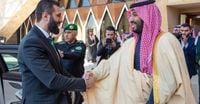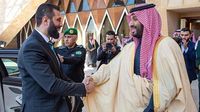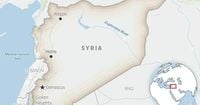On July 24, 2025, Syria and Saudi Arabia took a significant step toward rebuilding Syria’s shattered economy by announcing 47 investment agreements valued at approximately $6.4 billion. The deals, unveiled at the Syrian-Saudi Investment Forum in Damascus, cover a broad spectrum of sectors including real estate, telecommunications, finance, infrastructure, and technology, signaling a deepening partnership between the two nations under Syria’s new interim government.
Saudi Investment Minister Khalid Al-Falih, speaking at the forum, confirmed that the agreements involved over 100 companies and represented a major financial boost for Syria’s nascent leadership. He emphasized that Crown Prince Mohammed bin Salman had personally ordered the visit and investments, describing them as “confirmation of the kingdom’s firm and supportive stance towards sisterly Syria.”
The investment portfolio includes nearly $3 billion earmarked for real estate and infrastructure projects, with an additional $1.07 billion allocated to telecommunications and information technology sectors. Notable firms participating in these plans include Saudi Telecom Company (STC), GO Telecom, digital security company Elm, cybersecurity firm Cipher, and education technology provider Classera. These projects encompass housing, reconstruction of war-damaged areas, development of tourism, medical and entertainment sites, skyscrapers, and the establishment of three new cement factories.
Syrian Minister of Information Hamza al-Mustafa highlighted the economic impact of these deals, projecting the creation of around 50,000 direct jobs and 150,000 indirect employment opportunities. This injection of capital and development prospects comes at a critical juncture for Syria, which has been devastated by nearly 14 years of civil war and is grappling with extensive economic and social challenges.
The United Nations had estimated in 2017 that rebuilding Syria would require at least $250 billion, though some experts now believe reconstruction costs could escalate to $400 billion. Against this backdrop, the Saudi investments provide both a financial lifeline and a political endorsement for Syria’s interim government led by President Ahmad al-Sharaa, a former insurgent commander who assumed power following the swift collapse of Bashar al-Assad’s regime in December 2024.
President al-Sharaa, born in Saudi Arabia and having spent part of his childhood in Riyadh, made the Saudi capital the destination of his first official foreign visit earlier this year, underscoring the strategic pivot in Syria’s alliances. Under his leadership, Syria has distanced itself from its previous close ties with Iran and aligned more closely with Gulf States, including Saudi Arabia and Qatar. This shift is reflected in recent regional investments, such as a $7 billion electricity deal with Qatar in May 2025 and an $800 million agreement with Dubai-based DP World in July to develop the strategic Mediterranean port of Tartus.
Dr. Mohammad Nidal al-Shaar, Syria’s Minister of Economy and Industry, expressed enthusiasm about the renewed relationship with Saudi Arabia, stating, “We have been waiting for this moment with the Kingdom of Saudi Arabia for decades — a moment we were unfortunately deprived of for 60 years due to personal reasons tied to the former regime. Today, we move forward in building the new Syria.”
However, the announcement of these investments comes amid ongoing instability. Earlier in July, the southern province of Sweida was rocked by violent sectarian clashes between Sunni Muslim Bedouin clans and armed Druze minority groups. The Syrian government’s security forces sided with the Bedouins, leading to allegations of killings and looting that prompted revenge attacks by Druze factions. The violence displaced over 130,000 people and resulted in hundreds of deaths.
Israel also intervened militarily, launching strikes against Syrian government convoys and the Syrian Defense Ministry headquarters in Damascus, citing the need to protect the Druze minority. In a notable diplomatic development, Israeli Minister of Strategic Affairs Ron Dermer was reported to meet in Paris on July 24 with U.S. Special Envoy to Syria Tom Barrack and Syrian Foreign Minister Assad al-Shaibani to discuss security arrangements in southern Syria. This meeting, if confirmed, would mark the first publicized cabinet-level engagement between Israeli and Syrian officials since the Assad regime’s fall.
Experts note that these Saudi investments could pave the way for additional foreign capital necessary to rebuild Syria’s critical infrastructure, including power generation, roads, and ports. Gulf states and Turkey have shown interest in contributing to these efforts, while U.S. energy firms are preparing to draft a master plan for Syria’s energy sector.
Yet, concerns linger. Some analysts warn that the expedited lifting of sanctions and delisting of terror groups in Syria could risk these funds being diverted to extremist factions, prompting U.S. lawmakers to consider legislation holding Syria’s central government accountable for attacks on minorities and threatening to reimpose sanctions if security is not ensured.
Saudi Arabia and Qatar have also collaborated to repay Syria’s $15.5 million debt to the World Bank, enabling Syria to qualify for new loans essential to reconstruction. Additionally, the Saudi-Syrian Business Council was established during the forum to facilitate ongoing commercial cooperation, although the event had been delayed from June due to regional conflicts involving Iran and Israel.
As Syria embarks on this arduous path of recovery, the Saudi investments symbolize a broader geopolitical realignment in the Middle East and a hopeful, if cautious, step toward economic stabilization. Whether these ambitious projects can overcome the challenges of sectarian tensions, political fragility, and the immense scale of reconstruction remains to be seen, but the commitment from Riyadh offers a tangible vote of confidence in Syria’s new leadership and future prospects.






